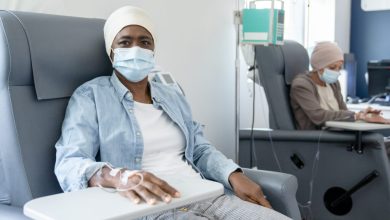Your Risk For Triple-Negative Breast Cancer Depends On Where You’re From – BlackDoctor.org


For years, the common understanding around triple-negative breast cancer has been straightforward. Black American women face this aggressive cancer at higher rates than women in other racial groups. Research from the American Cancer Society (ACS) reveals a more complex story. Risk is not equal across all Black women, and birthplace appears to play a meaningful role.
RELATED: 6 Tips For Black Women Coping With a Triple Negative Diagnosis
What the Study Found
ACS researchers examined data from 65,211 non-Hispanic Black women diagnosed with invasive breast cancer from 2010 through 2015. Birthplace was listed as the United States, East Africa, West Africa, or the Caribbean. The results revealed clear differences in how often triple-negative breast cancer appeared in each group.
When compared with Black women born in the United States:
- Women born in West Africa had similar rates
- Women born in the Caribbean had a 13 percent lower rate
- Women born in East Africa had a 47 percent lower rate
There were not enough cases to measure risk among women born in North, Central, or South Africa. Even so, this work stands out as one of the first large studies to look at risk within different groups of Black women rather than treating all Black women as a single category.
Why These Differences May Exist
The exact reasons are still unknown. Researchers suspect both biology and environment may be involved.
Genetics. Many US-born and Caribbean-born Black women trace most of their ancestry to West Africa. In several US cities, studies show that Black ancestry is about 71 percent Western African. If certain inherited traits are linked to a higher risk for triple-negative breast cancer, that may explain why women with West African roots appear more likely to be diagnosed.
Lifestyle and environment. Diet, stress, income levels, cultural norms, and access to healthcare also matter. Adoption of a Western diet and limited access to preventive care may play a part in increasing risk among US-born women. Meanwhile, women born in East Africa may maintain different lifestyle patterns or health behaviors that lower risk.
Social and structural factors. Racial bias in healthcare, differences in insurance coverage, and uneven screening access can delay diagnosis. When cancers are found later, they tend to be more aggressive and harder to treat.

Why This Matters
Triple-negative breast cancer develops faster, spreads sooner, and is harder to treat because it does not respond to hormone-based therapies. Early detection can make a major difference, and understanding which groups face higher risk helps doctors tailor screening recommendations.
The study highlights a simple point. Treating all Black women as one risk group hides meaningful differences. Better data on birthplace and ancestry could help doctors create more accurate prevention strategies.
“Our results tell us that knowledge based on such a broad categorization of Black versus white women may mask the complexity of the differences in breast cancer that appeared to be present within Black women,” says Hyuna Sung, PhD, the lead author.
RELATED: Triple Negative Breast Cancer: What Black Women Need To Know
What You Can Do Right Now
While researchers work to understand the causes behind these differences, there are steps Black women can take to protect their health and push for better care.
Know your family history.
If breast cancer runs in your family, especially at younger ages, talk to your doctor about genetic counseling or earlier screening.
Start screening on time.
The ACS recommends mammograms starting at age 40 for women at average risk. Women at higher risk may need to start earlier, get screened more often, or add MRI screening. Do not wait if something feels wrong.
Pay attention to changes.
Report any new lumps, swelling, skin changes, or nipple discharge. Triple-negative breast cancer grows fast, so early action matters.
Talk to your doctor about your background.
Birthplace and ancestry can be relevant. Bring it up even if your doctor does not ask.
Adopt heart-healthy habits.
A diet rich in fruits, vegetables, whole grains, and lean proteins supports overall health and can help lower cancer risk. Regular exercise, maintaining a healthy weight, and limiting alcohol also help.
Push for answers and second opinions.
If your concerns are dismissed or you feel rushed, seek another provider. The quality of communication between patient and doctor directly affects outcomes.
Stay connected to community resources.
Local breast cancer foundations, Black women’s health organizations, and support groups can help with screenings, financial support, and navigating care.
What Needs to Happen Next
The main limitation of the ACS study was missing birthplace information. The authors urge cancer registries to gather this data more completely. Better tracking will help researchers understand the full range of breast cancer risk among women of African descent and develop targeted solutions.
This work is a reminder. Black women are not a monolith. Genetics, culture, health systems, and history all shape health outcomes. Recognizing those differences can guide earlier detection, better treatment, and more personalized care.




